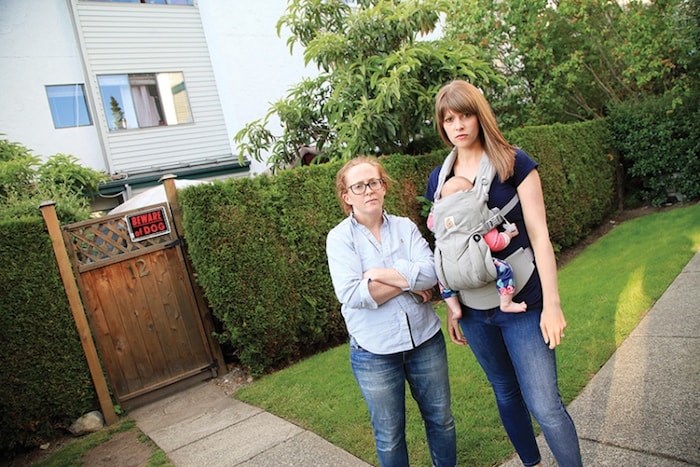A Central Lonsdale homeowner ordered multiple times by the courts to stop using her three-bedroom townhouse as a 15-bed hostel, has lost another bid to stay in business.
The B.C. Human Rights Tribunal has rejected Emily Yu’s complaint that her strata council was violating her human rights when it told her to stop accepting short-term guests in contravention of their bylaw.
Yu was first ordered by the Civil Resolution Tribunal to close her “Oasis Hostel,” which she advertised on Airbnb and other sites in 2017. She appealed to the B.C. Supreme Court and lost in 2018.
 Maeve Chamberlaine and Erin Wasney say they and their neighbours are exasperated after two years trying to shut down an 15-bed hostel within their townhouse complex. photo Kevin Hill, North Shore News
Maeve Chamberlaine and Erin Wasney say they and their neighbours are exasperated after two years trying to shut down an 15-bed hostel within their townhouse complex. photo Kevin Hill, North Shore News
Yu argued her post-concussion symptoms left her mentally disabled and reliant on renting out the rooms for money. While the judge expressed some sympathy, Yu did not bring enough evidence to show she was entitled to accommodations from her strata bylaws under the B.C. Human Rights Code, the court found.
But one month before the court’s decision, Yu filed a separate human rights complaint with the B.C. Human Rights Tribunal, arguing her strata’s refusal to grant her an exemption from the bylaw amounted to discrimination against her on the basis of a disability.
The Beeches strata argued the complaint should be tossed as Yu’s arguments had already been tested and rejected by the courts.
In a ruling released on June 26, Human Rights Tribunal member Devyn Cousineau, noted the B.C. Human Rights Code gives the tribunal discretion to dismiss a complaint where “the substance of the complaint or that part of the complaint has been appropriately dealt with in another proceeding.”
In her submissions, Yu argued her complaint should be allowed to proceed as it raised issues that “could potentially affect many marginalized women” and that to dismiss it would result in a “miscarriage of justice.”
Cousineau disagreed, however, and found it amounted to venue shopping.
“I do not find that these considerations can outweigh the finality, fairness and integrity of the justice system,” she wrote. “Ms. Yu has had an opportunity to advance her case in front of the CRT and then the B.C. Supreme Court. I can see no principled reason to allow her to re‐litigate the same issue again, this time in a different forum. As the Supreme Court of Canada has said: ‘Forum shopping for a different and better result can be dressed up in many attractive adjectives, but fairness is not among them.’”
If Yu wanted a review of the B.C. Supreme Court’s ruling, the proper remedy would be to appeal to a higher court, not the Human Rights Tribunal, Cousineau noted.
In April 2019, Yu was found in contempt of court for continuing to accept guests and fined $5,000.


